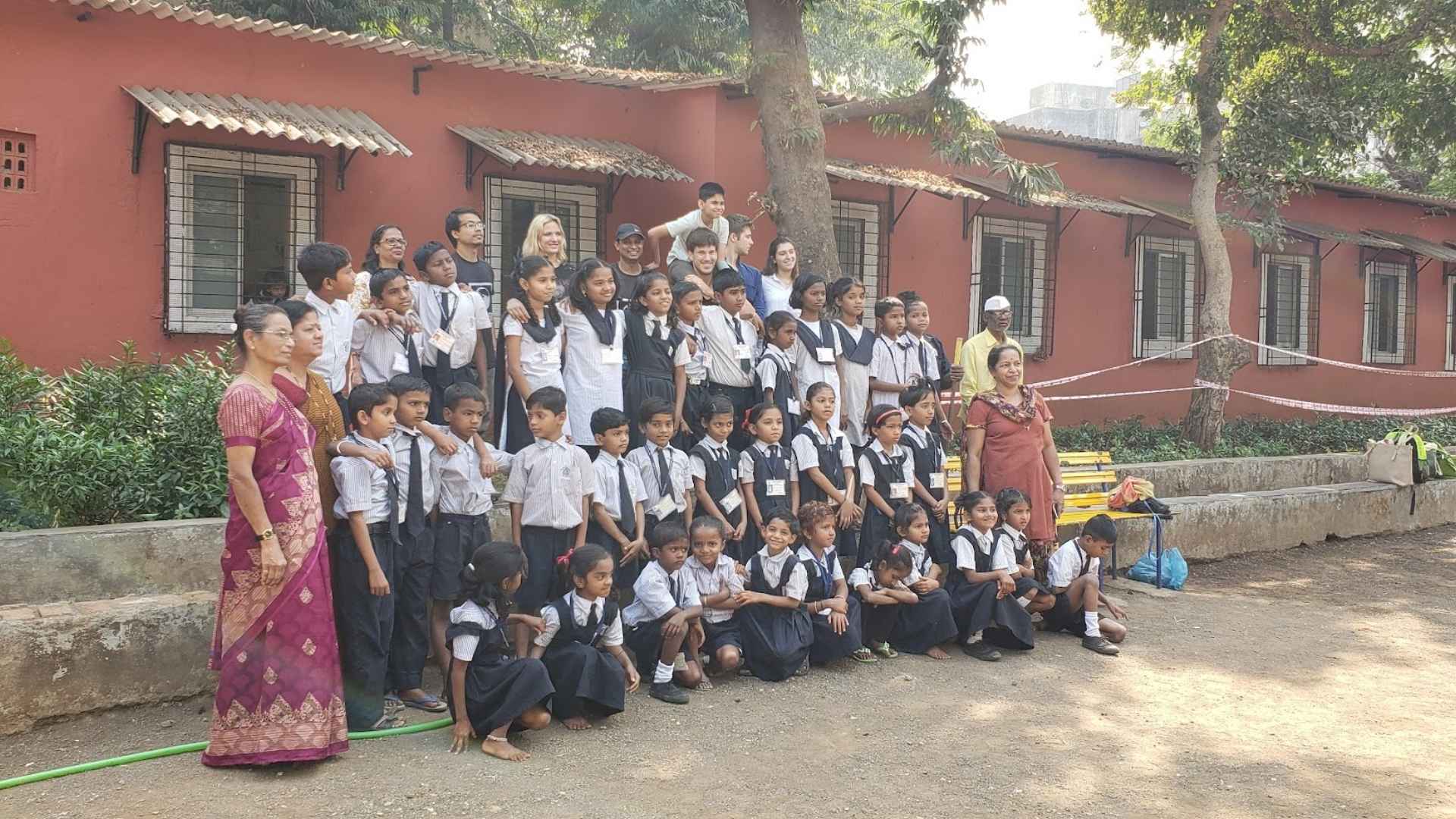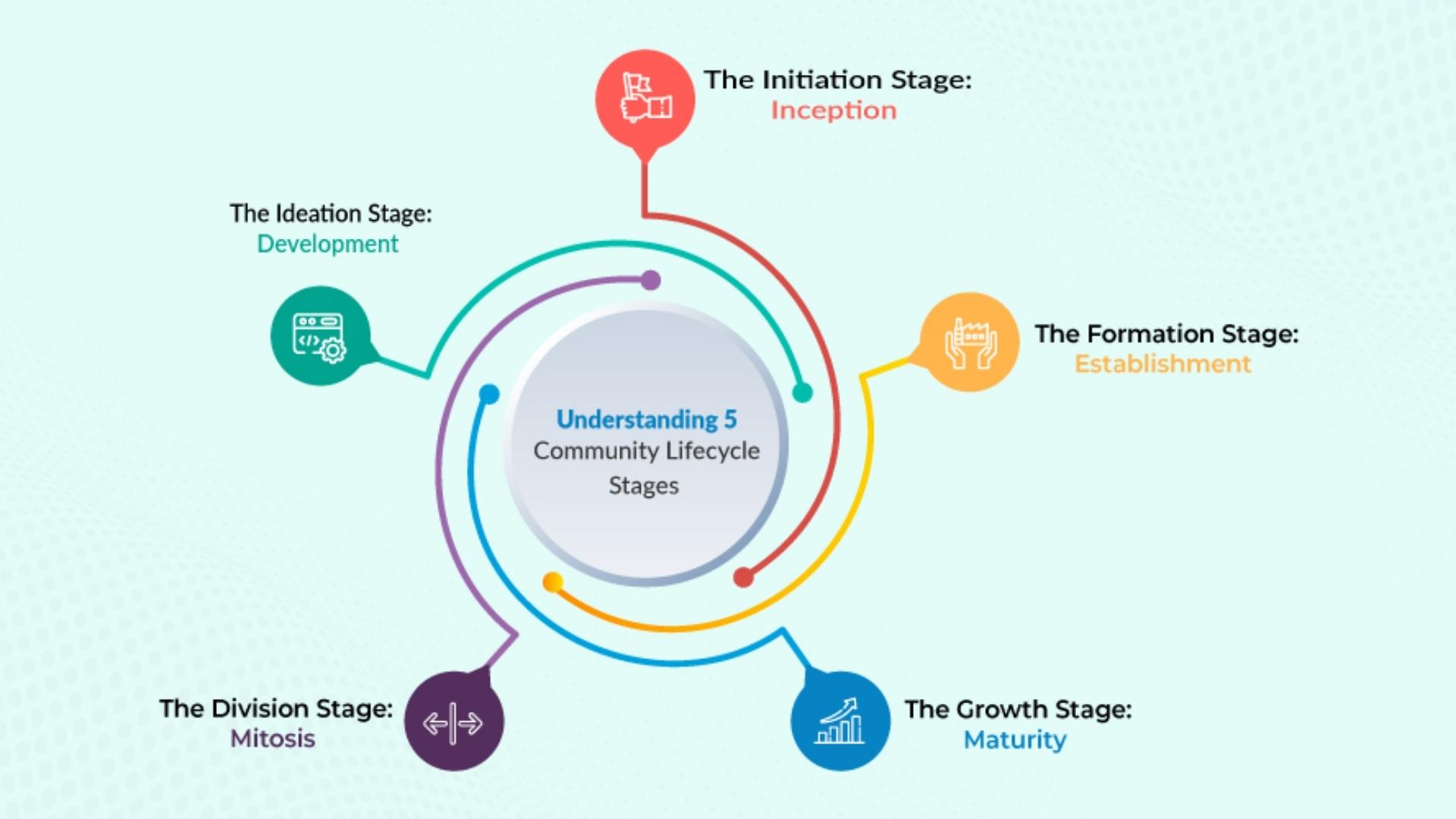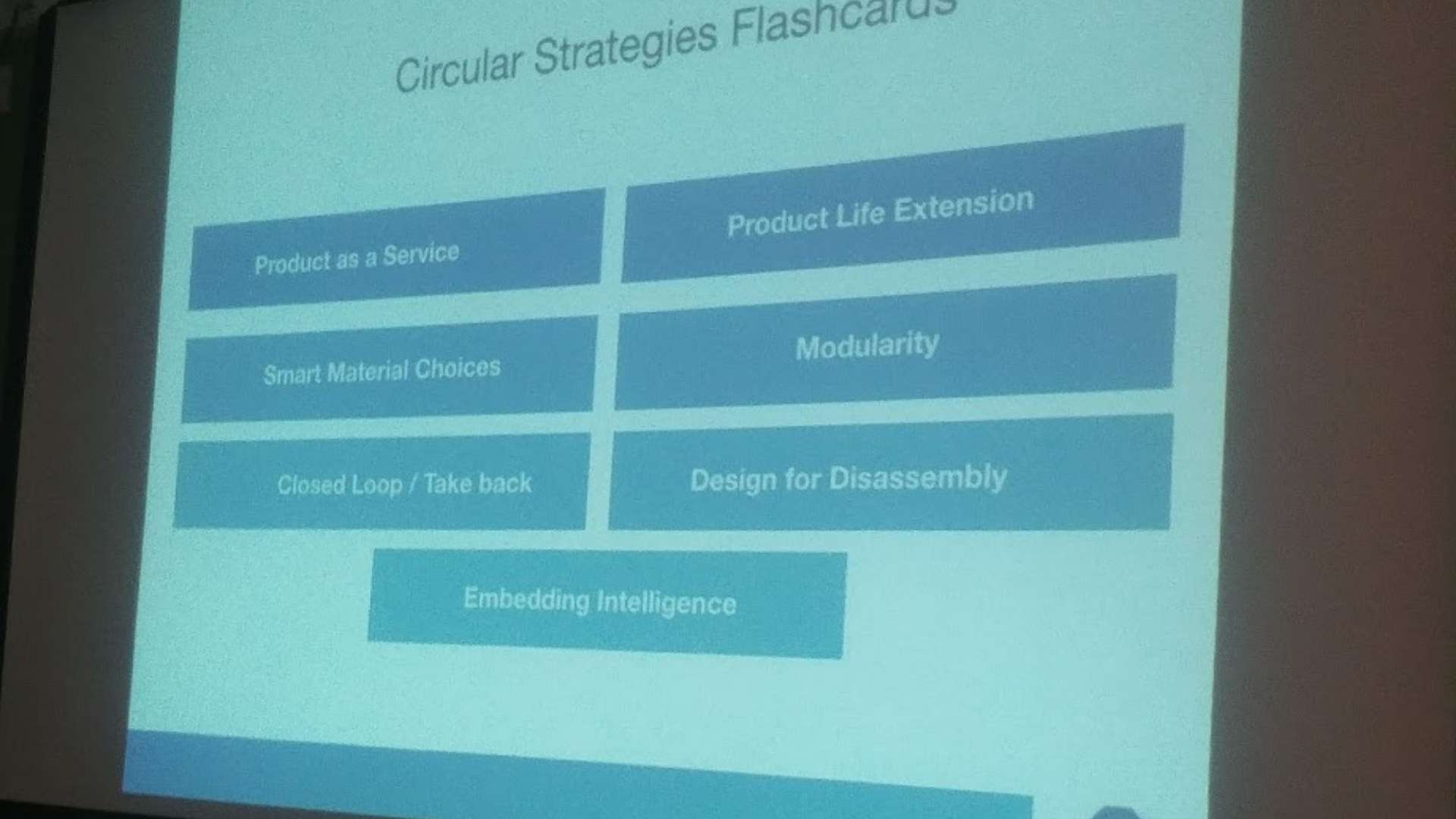Igniting Climate Literacy in Schools: Earth5R’s Model for Transformative Education
In an era where the impacts of climate change are becoming increasingly visible—from rising global temperatures to erratic weather patterns—the lack of climate education in schools and colleges is a glaring gap. According to a UNESCO report published in 2021, only 53% of national educational policies worldwide explicitly reference climate change, and a mere 20% of teachers feel equipped to teach climate-related topics effectively.
Recognizing this critical gap, Earth5R—a global sustainability organization—has pioneered an innovative Climate Education Engagement Model that aims to transform students into climate-conscious citizens. By integrating hands-on learning, technology, and real-world application, the model empowers students to become agents of environmental change.
This article will explore Earth5R’s Climate Education Engagement Model in detail, offering insights into its structure, scientific foundation, and measurable impact. Through case studies, data, and real-world examples, it will demonstrate how integrating climate education into academic settings can foster a generation of environmentally conscious leaders, equipped to tackle the global climate crisis head-on.
Bridging the Educational Gap: The Need for Climate Education in Schools and Colleges
A 2021 report by the Brookings Institution found that over 60% of students globally receive little to no formal education on climate change. In India, where air pollution, water scarcity, and deforestation pose severe environmental challenges, only 37% of schools include sustainability topics in their syllabi, according to a study by the Centre for Science and Environment.
The consequences of this gap are already visible. A survey conducted by the National Union of Students (NUS) in the UK revealed that 68% of students felt uninformed about the causes and effects of climate change, while 75% expressed a desire for stronger climate education.
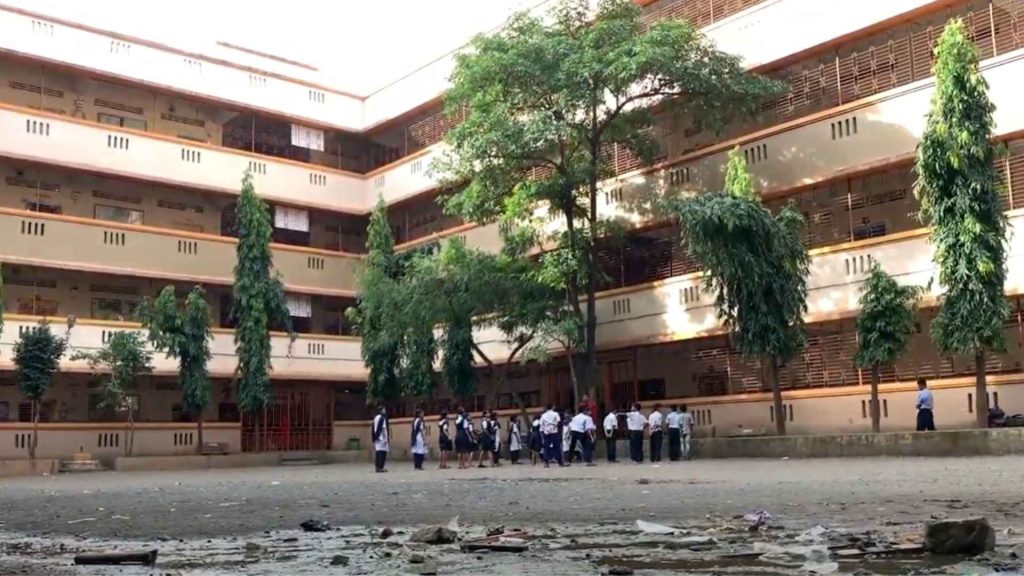
Scientific research underscores the long-term benefits of early climate education. A 2019 study published in Nature Climate Change demonstrated that children who participated in school-based environmental programs were 40% more likely to influence their families’ sustainability practices, such as reducing energy consumption and waste generation.
The program has resulted in higher environmental awareness scores and increased participation in sustainability initiatives. Similarly, in California, USA, the Climate Literacy Campaign integrates real-world environmental challenges into science and social studies lessons. The program has significantly improved students’ understanding of renewable energy technologies, resource management, and carbon footprint reduction.
Earth5R’s Climate Education Engagement Model – A Step-by-Step Framework for Transformative Learning
At the core of Earth5R’s model lies its science-backed curriculum development, meticulously aligned with global sustainability standards such as the Intergovernmental Panel on Climate Change (IPCC) guidelines and the United Nations Sustainable Development Goals (SDGs).
For instance, the waste management module goes beyond teaching the three Rs (Reduce, Reuse, Recycle) by engaging students in plastic audits and waste segregation activities. Through these hands-on exercises, students learn to identify, quantify, and categorize waste, making the problem tangible and actionable.
To make climate education engaging and memorable, Earth5R incorporates innovative student engagement strategies. The model goes beyond traditional classroom lectures by organizing interactive workshops, seminars, and awareness drives. These sessions often feature environmental experts, scientists, and sustainability leaders, offering students first-hand insights into real-world climate issues.
A key component of Earth5R’s framework is its teacher training and capacity-building initiatives. Recognizing that educators play a pivotal role in shaping student perspectives, Earth5R equips teachers with the necessary skills and resources to deliver impactful climate education. Through dedicated training programs, teachers learn how to integrate climate literacy into existing subjects, making sustainability a seamless part of the academic curriculum.
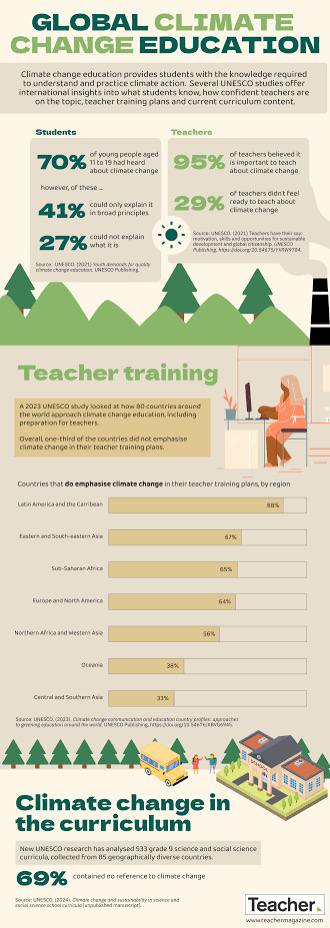
This infographic highlights the global state of climate change education, revealing that while a majority of students have heard of it, a significant portion lacks understanding, and many teachers feel unprepared to teach the subject effectively.
The integration of technology and gamification is another standout feature of Earth5R’s model, making climate education engaging, measurable, and accessible. The Earth5R mobile app serves as a central platform where students can access educational modules, participate in eco-challenges, and track their progress.
Through gamified learning techniques, students earn green points, digital badges, and certificates for completing courses and participating in environmental activities. This reward-based system fosters healthy competition while motivating students to take consistent climate action.
For instance, students who successfully complete a waste audit challenge or participate in community clean-up events receive green points, which can be redeemed for eco-friendly products, discounts, or recognition certificates. This gamified incentive model not only boosts participation rates but also makes sustainability fun and rewarding.
Ultimately, Earth5R’s step-by-step framework transforms climate education from a passive learning experience into an active, solution-oriented journey. By combining scientific knowledge with hands-on action, teacher training, and gamified technology, the model empowers students to become climate leaders.
Measuring Impact and Outcomes: Evaluating the Effectiveness of Earth5R’s Climate Education Model
As climate education programs gain momentum, measuring their real-world impact is essential to assess their effectiveness and sustainability. Earth5R’s Climate Education Engagement Model goes beyond mere classroom instruction by implementing comprehensive evaluation strategies to gauge its influence on student knowledge, behavior, and community action.
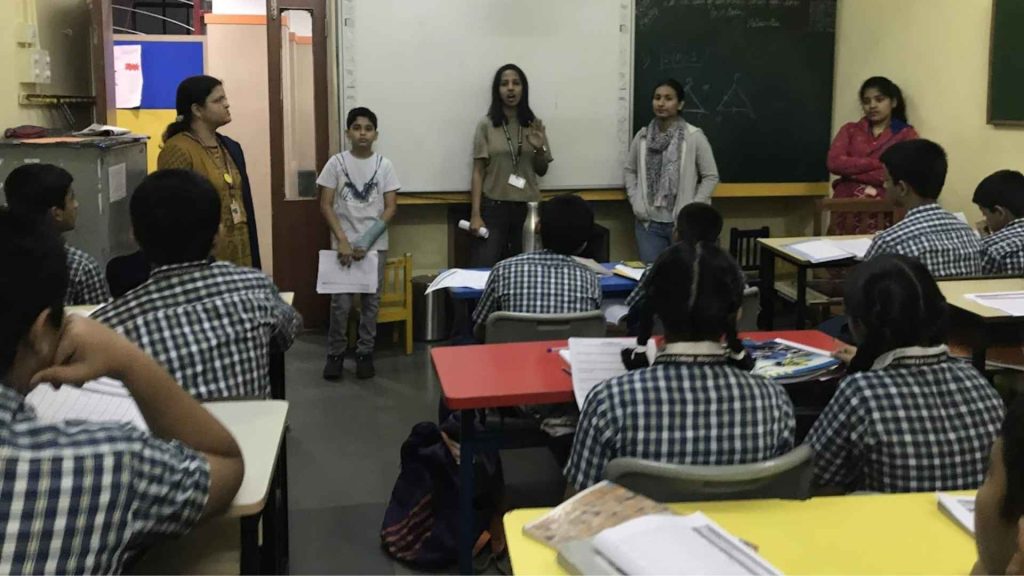
The real measure of success goes beyond knowledge—it is reflected in students’ behavioral transformation. Earth5R’s model fosters climate-conscious habits, encouraging students to adopt eco-friendly practices in their daily lives. For example, schools that participated in Earth5R’s plastic audit campaigns reported that students reduced their plastic consumption by nearly 25% over the course of the program.
The program’s outreach component also plays a pivotal role in amplifying its impact. Earth5R encourages students to extend their environmental knowledge into their communities, creating a ripple effect of awareness and action. Through neighborhood eco-drives, plastic cleanup campaigns, and water conservation projects, students apply their skills to real-world challenges.
For example, students in Mumbai schools, after attending Earth5R’s workshops, collaborated with their local communities to conduct riverbank clean-ups, significantly reducing plastic waste along the Mithi River’s edges. Similarly, college students trained in sustainability practices organized eco-awareness events in their neighborhoods, reaching hundreds of residents and promoting better waste management practices.
To quantify the program’s effectiveness, Earth5R employs data collection and metrics-based analysis. The model tracks the amount of waste collected, recycled, or reduced as a direct result of student-led initiatives. For instance, in schools where waste audits were conducted, students collectively segregated and recycled over 2,000 kg of plastic waste in a single year.
In essence, Earth5R’s Climate Education Engagement Model stands out not only for its innovative curriculum and student-centric approach but also for its measurable, real-world impact. By empowering students with knowledge, inspiring action, and driving institutional change, the model fosters a generation of environmentally responsible citizens.
Broader Implications and Scalability: Expanding Earth5R’s Climate Education Model Globally
One of the most significant advantages of Earth5R’s model is its easy adaptability to different educational systems and regions. The program’s modular curriculum—which covers topics like climate science, circular economy, and renewable energy—can be tailored to suit diverse educational boards and learning environments.
For example, while schools in urban areas might focus on plastic audits, waste management, and water conservation, rural schools can emphasize agricultural sustainability and forest preservation. The flexibility of the program ensures that it can be customized to address specific local environmental challenges, making it relevant and effective across geographies and demographics.
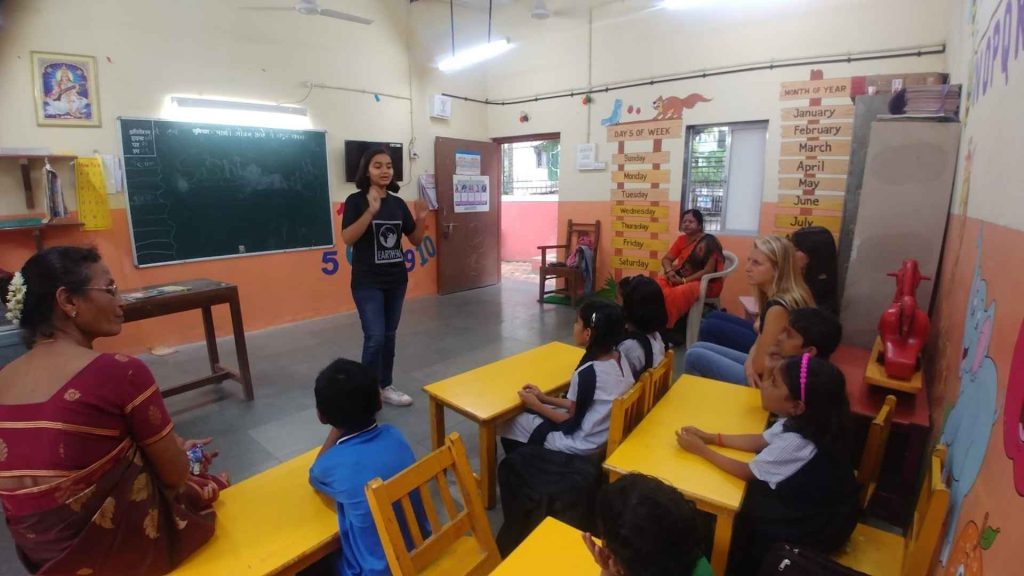
Beyond its direct educational impact, Earth5R’s model contributes to the United Nations Sustainable Development Goals (SDGs), particularly SDG 4 (Quality Education) and SDG 13 (Climate Action). By enhancing climate literacy among students, the program directly supports SDG 4.7, which promotes education for sustainable development and global citizenship.
Moreover, by empowering students to participate in eco-drives, waste management, and conservation projects, the model advances SDG 13, fostering climate action at the grassroots level. Through hands-on involvement in real-world sustainability efforts, students are transformed into active agents of change, driving progress toward the 2030 Agenda for Sustainable Development.
The model’s scalability is further amplified through the strategic use of technology and digital platforms. The Earth5R mobile app, which integrates gamified learning, volunteer tracking, and environmental challenges, allows for mass participation and remote learning scalability. By offering interactive modules, eco-challenges, and reward-based systems, the app keeps students engaged while tracking their progress and contributions.
This tech-driven approach makes it possible for students in different countries to participate in the same eco-challenges, creating a global community of environmentally conscious youth. For example, through the app, students from schools in India, France, and Brazil can collectively contribute to virtual plastic clean-up drives or track their carbon footprint reduction, fostering international collaboration on climate action.
As these students carry their eco-conscious behaviors into adulthood, they can influence their families, workplaces, and communities, creating a cascading impact of environmental responsibility. Moreover, by empowering students with green skills and sustainability knowledge, the model enhances their employability in the growing green economy, contributing to long-term socio-economic benefits.
Case Studies from Earth5R : Real life impacts
Earth5R has developed several initiatives aimed at integrating climate education into schools and colleges. These programs emphasize hands-on learning, community involvement, and the use of technology to foster environmental awareness among students. Notable initiatives include:
Earth5R App and Internship Program
The Earth5R App serves as a comprehensive platform offering resources on environmental sustainability and social responsibility. It features articles, videos, interactive quizzes, and a social network for users to share ideas and projects. Complementing the app, the Earth5R Internship Program is an eight-week course designed to equip young individuals with skills and knowledge in sustainability. The program encompasses eleven modules covering topics such as environmental pollution, ecosystems and biodiversity, deforestation, waste management, and climate change. Participants engage in study materials, case studies, quizzes, outdoor activities, and post-activity discussions to reinforce learning.
Sustainability Workshops in Educational Institutions
Recognizing the importance of early education in sustainability, Earth5R conducts hands-on workshops in schools focusing on waste management and upcycling. Students participate in month-long projects aimed at transforming their homes into zero-waste environments, culminating in project reports and environmental certifications. This initiative empowers students to become environmental stewards, extending sustainable practices beyond the classroom.
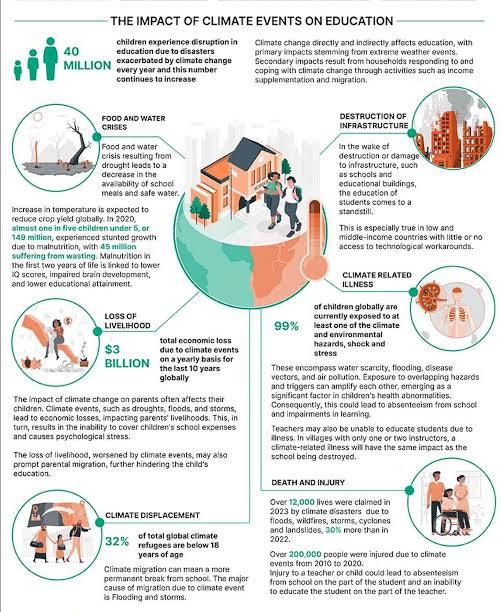
This infographic details the devastating impact of climate events on education, showing how disasters disrupt learning for millions of children and exacerbate existing inequalities. It highlights the wide-ranging consequences, from food insecurity and infrastructure damage to health issues and displacement, all hindering educational access and quality.
Nikola Tesla Young Researchers Development Program
Earth5R’s Nikola Tesla Young Researchers Development Program is a global initiative offering research internships focused on sustainability. Aimed at engaging at least 10,000 students within its first year, the program empowers participants to contribute to real-time environmental data collection through the Earth5R app. Open to school and college students worldwide, the curriculum combines theoretical knowledge with practical application, ensuring a holistic understanding of sustainability. The program culminates in a research symposium where students present their findings, fostering a global platform for sustainability discourse.
Global Climate Fellowship
The Earth5R Climate Fellowship is a six-month sustainability leadership program designed for students from Grade 9 to undergraduates. It offers direct mentorship from climate experts, engagement in live sustainability projects, and opportunities to build an impressive portfolio for university admissions. Fellows gain exposure to global leaders, diplomats, and policymakers, equipping them with the skills and networks necessary for impactful careers in sustainability.
Environmental Volunteering Opportunities
Earth5R offers environmental volunteering opportunities that provide numerous benefits, including making a positive impact on the environment and professional growth. Volunteers can participate in events such as beach cleanups, tree plantation drives, and waste management initiatives that help reduce environmental pollution. These initiatives play a vital role in promoting sustainable development and preserving the natural environment.
Through these initiatives, Earth5R effectively integrates climate education into academic settings, fostering a culture of sustainability among students and educators alike.
Overcoming the Roadblocks: Challenges and Solutions in Climate Education
One of the most persistent challenges in promoting climate education is the lack of institutional support from schools and colleges. Many educational institutions operate on outdated curricula that prioritize traditional subjects over environmental literacy.
As a result, climate education is often treated as a supplementary activity rather than a core academic component. Furthermore, resource limitations—such as the absence of funding for educational materials or trained staff—further hinder the integration of sustainability programs.
To overcome this resistance, Earth5R advocates for systemic policy changes and forges strategic partnerships with NGOs, educational boards, and government bodies. By demonstrating the long-term benefits of climate education—such as enhanced student employability in green sectors and institutional sustainability rankings—Earth5R encourages schools and colleges to prioritize eco-literacy.
Another major obstacle is student apathy and lack of engagement with climate issues. Despite the growing visibility of climate change through media coverage, many students perceive it as a distant, abstract problem with little relevance to their daily lives. This disconnect between awareness and action often results in low participation rates in eco-activities or sustainability programs.
To combat this indifference, Earth5R employs gamified learning strategies that make climate education interactive, rewarding, and fun. Through the Earth5R mobile app, students participate in eco-challenges such as waste reduction competitions, tree-planting drives, and plastic audits.
By earning green points and digital badges for their contributions, students gain tangible incentives for their environmental actions. For example, students who actively participate in river cleanup campaigns receive certificates of recognition and redeemable points that can be exchanged for eco-friendly products or discounts. This reward-based system significantly boosts student motivation and sustained participation.
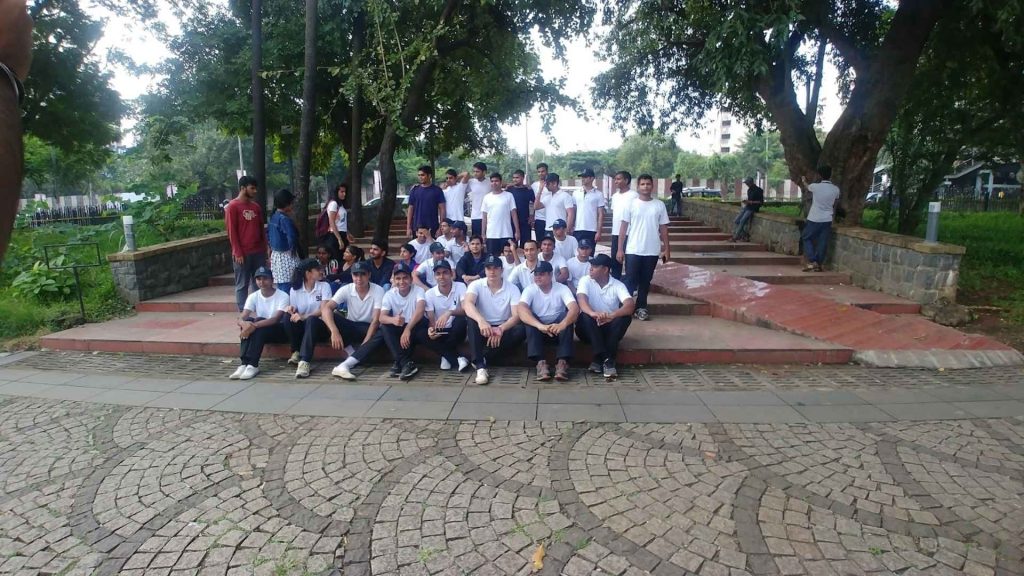
Moreover, Earth5R organizes climate hackathons, sustainability contests, and eco-themed competitions to foster friendly rivalry and collective action. For instance, inter-school competitions where students compete to design the most energy-efficient classroom or reduce the most plastic waste incentivize creative problem-solving and real-world application of sustainability principles.
A third significant challenge is the limited climate literacy among educators. Many teachers, particularly in non-science disciplines, lack the training and expertise required to effectively teach climate-related subjects. Without adequate knowledge of climate science, renewable energy, and sustainability practices, educators often struggle to convey complex environmental concepts in a relatable and engaging manner.
To bridge this knowledge gap, Earth5R offers teacher capacity-building programs that provide specialized training in climate literacy. Through workshops, webinars, and hands-on activities, teachers learn how to integrate climate education into their regular subjects, making sustainability a natural extension of existing curricula.
Empowering Future Generations: The Transformative Power of Climate Education
In an era where climate change is one of the most pressing global challenges, climate education stands out as a powerful catalyst for sustainable transformation. By instilling eco-conscious values and practical sustainability skills in young minds, educational institutions play a vital role in shaping a generation of environmentally responsible citizens.
The Earth5R model demonstrates that effective climate education goes beyond textbooks. By integrating interactive workshops, hands-on activities, and real-world community engagement, the model bridges the gap between theory and practice. Students don’t just learn about climate science—they actively participate in environmental solutions.
Whether conducting plastic audits, planting trees, or promoting waste segregation, students are empowered to drive tangible, positive change in their communities. This experiential learning approach not only deepens their understanding of sustainability but also fosters a lifelong commitment to environmental stewardship.
A key takeaway from Earth5R’s model is its emphasis on technology and gamification to enhance engagement and scalability. Through the Earth5R mobile app, students and teachers can access educational resources, participate in eco-challenges, and track their environmental contributions.
The gamified reward system—where students earn green points and digital badges for their eco-actions—makes climate education fun, competitive, and rewarding. This interactive and tech-enabled format ensures that the program is scalable and adaptable to diverse educational institutions, from small rural schools to large urban colleges.
Moreover, the model’s structured and data-driven approach ensures measurable impact. By tracking knowledge retention, waste reduction, and student participation rates, Earth5R demonstrates tangible results that can be used for policy advocacy.
FAQs on Earth5R’s Climate Education Engagement Model for Schools and Colleges
What is Earth5R’s Climate Education Engagement Model?
Earth5R’s Climate Education Engagement Model is a comprehensive framework designed to integrate climate literacy into school and college curricula. It uses a blend of interactive learning, community engagement, and technology-driven solutions to educate students about climate change, sustainability, and eco-conscious practices.
Why is climate education important for students?
Climate education equips students with scientific knowledge and practical skills to understand environmental challenges. It fosters eco-conscious behavior, promotes sustainable decision-making, and empowers students to become active participants in climate action.
How does Earth5R engage students in climate education?
Earth5R engages students through workshops, seminars, and hands-on activities like plastic audits, eco-challenges, and waste segregation drives. It also uses its mobile app to provide gamified learning experiences, making education interactive and impactful.
What topics are covered in Earth5R’s climate education curriculum?
The curriculum covers a wide range of topics, including climate science, renewable energy, waste management, circular economy, water conservation, and biodiversity preservation. It also includes real-world case studies and practical sustainability solutions.
How does Earth5R incorporate technology into climate education?
Earth5R uses its mobile app to offer interactive challenges, educational resources, and reward-based learning. Students earn green points for their eco-actions, which can be redeemed for incentives, making learning engaging and rewarding.
What role do teachers play in the Earth5R model?
Teachers act as facilitators and mentors, guiding students through climate education activities. Earth5R provides teacher training programs to help educators incorporate sustainability concepts into their teaching methodologies.
How does Earth5R measure the impact of its climate education programs?
Impact is measured through pre- and post-program assessments to track students’ knowledge retention and behavior changes. Metrics include waste reduction rates, eco-challenge participation, and student feedback.
Are students involved in real-world sustainability projects?
Yes, students participate in community-based projects such as river cleanups, waste management drives, and biodiversity conservation initiatives. This hands-on experience reinforces their learning and promotes active citizenship.
What is the significance of gamified learning in climate education?
Gamified learning makes climate education more engaging and participatory. Through Earth5R’s app, students earn points, receive badges, and participate in leaderboards, which boosts motivation and encourages consistent eco-friendly actions.
How does Earth5R collaborate with schools and colleges?
Earth5R partners with educational institutions to integrate climate education into their curricula. They provide learning modules, teacher training, and digital tools to support schools and colleges in implementing sustainable practices.
What are the long-term benefits of Earth5R’s climate education model?
The long-term benefits include increased environmental literacy, eco-conscious behavior, and advocacy skills among students. It also promotes the adoption of sustainable practices in educational institutions and communities.
How does Earth5R’s model contribute to the Sustainable Development Goals (SDGs)?
Earth5R’s model aligns with SDG 4 (Quality Education) and SDG 13 (Climate Action) by promoting climate literacy and sustainable behaviors. It also supports SDG 11 (Sustainable Cities and Communities) through community-driven initiatives.
What role do parents play in Earth5R’s climate education model?
Parents are encouraged to participate in awareness sessions, eco-challenges, and sustainability drives. Their involvement reinforces eco-conscious practices at home, creating a holistic learning environment for students.
Can schools customize Earth5R’s climate education curriculum?
Yes, Earth5R offers customizable learning modules based on the school’s specific requirements. Institutions can select topics, activities, and duration to align with their educational goals and student demographics.
How does Earth5R promote sustainability beyond schools and colleges?
Earth5R extends its climate education model to local communities, NGOs, and corporate organizations, promoting large-scale sustainability campaigns and encouraging public participation in eco-initiatives.
Are there any certifications or rewards for students and teachers?
Yes, students and teachers receive certificates of participation and recognition. Students can also earn green points through the Earth5R app, which can be redeemed for rewards, promoting continuous engagement.
How does Earth5R’s model empower teachers with climate knowledge?
Through teacher training programs, Earth5R equips educators with scientific knowledge, teaching resources, and interactive tools. This empowers them to effectively teach climate science and sustainability concepts.
What are the real-world outcomes of Earth5R’s climate education programs?
Real-world outcomes include waste reduction, biodiversity restoration, and community-led sustainability initiatives. Schools also adopt eco-friendly practices such as rainwater harvesting and energy conservation.
How can schools and colleges collaborate with Earth5R?
Schools and colleges can collaborate with Earth5R by partnering for climate education programs, conducting workshops, and integrating sustainability modules into their curriculum. They can also engage in Earth5R’s eco-challenges and volunteer initiatives.
What makes Earth5R’s climate education model unique?
Earth5R’s model stands out due to its scientifically backed curriculum, hands-on learning experiences, and technology-driven engagement. Its focus on community participation and measurable impact makes it scalable and replicable for educational institutions worldwide.
Call to action : Empower the Next Generation with Climate Education
The fight against climate change begins with education, and Earth5R’s Climate Education Engagement Model offers a proven, replicable, and impactful framework to make this a reality. However, scaling this movement requires the active participation of schools, colleges, policymakers, and communities.
Educational institutions have a critical role to play. School administrators, principals, and college boards must prioritize integrating climate education into their curricula. By adopting Earth5R’s model, they can offer students hands-on sustainability experiences, equipping them with practical eco-skills and fostering a sense of responsibility toward the planet.
Policymakers and government agencies must recognize the need for structured climate education in schools and colleges. Incorporating Earth5R’s scalable framework into national and regional education policies can help mainstream environmental literacy. By advocating for mandatory climate education, governments can foster a generation of environmentally aware citizens capable of driving large-scale sustainability efforts.
The role of parents, teachers, and communities is equally vital. Parents can encourage eco-conscious habits at home, involve their children in local sustainability activities, and support schools in adopting climate programs. Teachers can lead by example by practicing sustainable behaviors and incorporating climate discussions into everyday lessons.

